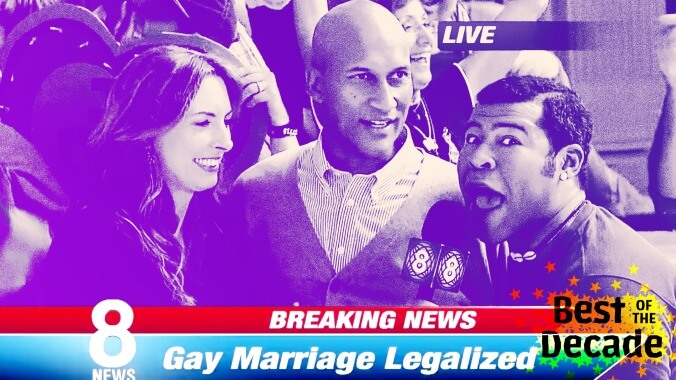This just in: How the decade’s biggest news was captured in the most memorable art
Image: Graphic: Libby McGuire
There’s a duality to pop culture that works to satisfy two fairly opposing objectives. On one hand, it can serve as a handy means of escapism, carving out spaces that shield us from worldly stress. When the news becomes cumbersome, music, film, television, and even memes can occasionally do their part to shoulder some of the load.
On the other hand, pop culture has the enduring power to entomb a certain time and place, capturing our environment in ways that mere recollection simply can’t. Just as some of our personal, most prominent memories are attached to songs and shows and films, some of the biggest historical events of the decade have been granted a shot at immortality thanks to the artists who felt inspired by them. When lyrics double as time capsules, political criticism gets filtered through a half-hour sitcom, or a comic book simply acknowledges a serious need for social change, the relationship between art and news becomes clearer, more necessary. From a booming anthem encouraging community resilience to an award-winning dig at a historically inaccurate press secretary, here’s how pop culture rendered some of the most memorable entertainment from the decade’s biggest news.
2010: South Park lampoons changing medicinal marijuana laws in “Medicinal Fried Chicken”
Matt Stone and Trey Parker have tendered a decades-long history of providing distinct (and efficient) commentary on current events via Comedy Central tentpole South Park. In 2010, at the start of its 14th season, Colorado was on the cusp of enacting state laws that would open the doors for regulated medicinal marijuana businesses while considering major restrictions for fast food eateries. Continuing its talent for gleaning possibilities from the most absurd threads of real-life events, the show’s 198th episode, “Medicinal Fried Chicken,” followed the men of South Park, Colorado as they exposed themselves to threats of testicular cancer in order to obtain prescriptions for pot. Meanwhile, Cartman rose the ranks as a chicken-slinging crime boss, signaling Scarface. Like most of the series to date, the episode uniquely blended Parker and Stone’s brand of sophomoric humor and social satire, shining a bright light on the state’s willingness to implement more stringent laws on fast food than medicinal drugs.
2012: The legalization of gay marriage begins, and Key & Peele delivers one of its most memorable sketches
[pm_embed_youtube id=’PLGdZnIftrYirF_el5zHOUvg8sV-ap4Q-C’ type=’playlist’]“We’re gonna rent the moon and fill it with rosé!” In 2012, Maine, Maryland, and Washington became the first states to legalize gay marriage. That same year, longtime creative partners Keegan-Michael Key and Jordan Peele premiered their Comedy Central sketch show, Key & Peele, which quickly established itself as a cultural mainstay with bits like “Gay Marriage Legalized.” The hilarious sketch was both a celebration of the country’s necessary step forward and a solid reminder that not every person affected by the law—no matter how ostensibly favorable it may be—necessarily wants the same thing. Either way, we hope Lashawn was granted the destination cloud wedding he so richly deserved.
